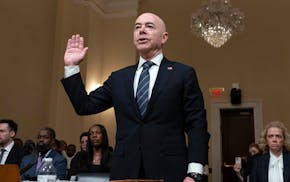The national epidemic of smartphone thefts is prompting lawmakers in Minnesota and across the country to push for requirements that the devices carry technology that would render them useless if stolen.
One in three robberies now involve smartphones, at a cost of $30 billion each year, federal officials said. Smartphone thefts have figured in a series of high-profile robberies on and around the University of Minnesota campus in recent months, and Mark Andrew, a former Hennepin County commissioner and unsuccessful Minneapolis mayoral candidate, was badly beaten by thieves who stole his phone at the Mall of America.
The market for hot phones is boosted by easy resale at automated kiosks, local stores and online sites. In China or South America, a used iPhone can sell for hundreds of dollars more than in the United States. University of Minnesota Police Chief Greg Hestness warned a state Senate panel last month that the practice of stealing iPhones — known as "Apple picking" — has thieves coming to the U campus to find students to rob, often by flashing a gun.
"We're literally looking at an explosion in these sorts of crimes, and the level of violence is increasing, and it doesn't appear to be going in any direction but up," said Rep. Joe Atkins, DFL-Inver Grove Heights. He is drafting a bill that would require all phones sold in Minnesota to be equipped with a "kill switch" or a remote signal that would permanently disable phones that fall into the hands of thieves.
Atkins, who said he is frustrated that the industry has not done more to make the phones less attractive to thieves, said his proposed measure would be among the first of its kind in the nation. A similar bill is in the works in California.
"Frankly, I was hoping the industry would adopt this approach on their own, but thus far they haven't," Atkins said.
Phone makers and service providers offered competing views on which arm of the industry is resisting such devices, but a trade group representing wireless providers has warned that the kill-switch technology could impair phone services for customers or allow hackers to attack phones used by national security agencies and law enforcement. Instead, the group, known as CTIA, The Wireless Association, has helped to launch a national phone-tracking database, which it touts as a key theft deterrent.
But pressure is building for tougher action at both federal and state levels.
In Washington, U.S. Sen. Amy Klobuchar, D-Minn., wrote a letter to the CEOs of major wireless providers Sprint, Verizon, T-Mobile, AT & T and U.S. Cellular on Dec. 30, urging them to explain why they did not embrace the kill-switch technology.
"Additional action to protect wireless consumers is necessary and that's why I am asking you for this information," Klobuchar wrote. "The status quo is not acceptable."
New York State Attorney General Eric T. Schneiderman has also demanded action.
Insurance premiums at play
Verizon Wireless spokeswoman Debi Lewis said in a statement that the provider supports a kill switch for its Android devices, but contended that "no manufacturer has made one available to us."
"Once a manufacturer provides us an Android 'kill switch' that is free to consumers, we will work to provide it to our customers," Lewis said.
Kelly Harfoot, a spokeswoman for U.S. Cellular, said Friday, "We are currently reviewing Sen. Klobuchar's letter and will respond soon. U.S. Cellular has not rejected a 'kill switch' proposal from Samsung and, despite reports to the contrary, Samsung has never made such a proposal to U.S. Cellular, nor asked for our views or our permission on whether to include one in their devices. As new technologies become available, we will give them prompt consideration in determining their utility in preventing smartphone theft, as safety of our customers is of paramount importance to us."
California State Sen. Mark Leno, who plans to propose a similar bill mandating kill switches in his home state, said the industry's reluctance to adopt the technology is likely motivated by the fact that the nation's top four wireless carriers made $7.8 billion in phone insurance premiums from their customers. If fewer phones are stolen, fewer premiums are paid.
"If we're successful in our efforts in acquiring a device that renders a mobile device inoperable, there is much less need or desire for an insurance product," Leno said. "We will continue to work with the CTIA to try to make our bill as effective as possible. It will be up to the industry to decide whether they want to become part of the solution or remain part of the problem."
Abby Simons • 651-925-5043
New Black congressional district in Louisiana bows to politics, not race, backers say
Trump trial jury selection process follows a familiar pattern with an unpredictable outcome
Climate change concerns grow, but few think Biden's climate law will help, AP-NORC poll finds
